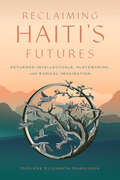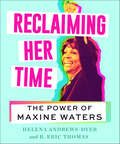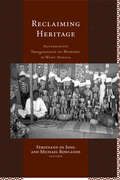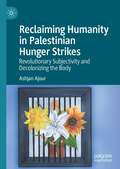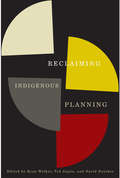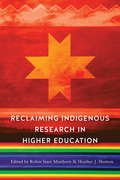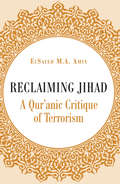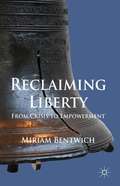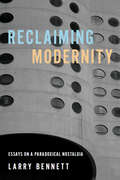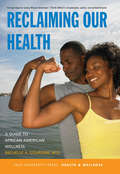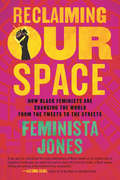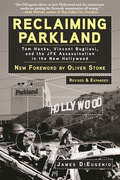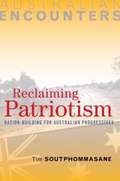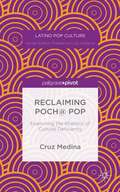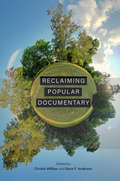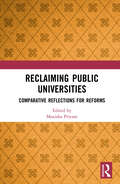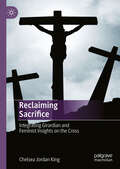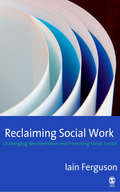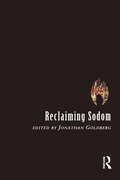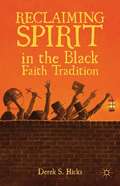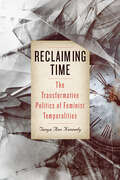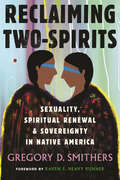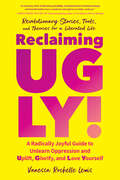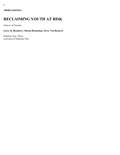- Table View
- List View
Reclaiming Haiti's Futures: Returned Intellectuals, Placemaking, and Radical Imagination (Critical Caribbean Studies)
by Darlène Elizabeth DubuissonHaiti was once a beacon of Black liberatory futures, but now it is often depicted as a place with no future where emigration is the only way out for most of its population. But Reclaiming Haiti's Futures tells a different story. It is a story about two generations of Haitian scholars who returned home after particular crises to partake in social change. The first generation, called jenerasyon 86, were intellectuals who fled Haiti during the Duvalier dictatorship (1957–1986). They returned after the regime fell to participate in the democratic transition through their political leadership and activism. The younger generation, dubbed the jenn doktè, returned after the 2010 earthquake to partake in national reconstruction through public higher education reform. An ethnography of the future, the book explores how these returned scholars resisted coloniality's fractures and displacements by working toward and creating inhabitability or future-oriented places of belonging through improvisation, rasanblaj (assembly), and radical imagination. By centering on Haiti and the Caribbean, the book offers insights not just into the Haitian experience but also into how fractures have come to typify more aspects of life globally and what we might do about it.
Reclaiming Her Time: The Power of Maxine Waters
by R. Eric Thomas Helena Andrews-DyerNamed a Best Political Book of the Year by The AtlanticIn the tradition of Notorious RBG, a lively, beautifully designed, full-color illustrated celebration of the life, wisdom, wit, legacy, and fearless style of iconic American Congresswoman Maxine Waters.“Let me just say this: I’m a strong black woman, and I cannot be intimidated. I cannot be undermined. I cannot be thought to be afraid of Bill O’Reilly or anyone.”—Maxine Waters To millions nationwide, Congresswoman Maxine Waters is a hero of the resistance and an icon, serving eye rolls, withering looks, and sharp retorts to any who dare waste her time on nonsense. But behind the Auntie Maxine meme is a seasoned public servant and she’s not here to play. Throughout her forty years in public service and eighty years on earth, U.S. Representative for California’s 43rd district has been a role model, a crusader for justice, a game-changer, a trailblazer, and an advocate for the marginalized who has long defied her critics, including her most vocal detractor, Donald J. Trump. And she’s just getting started. From her anti-apartheid work and support of affirmative action to her passionate opposition to the Iraq War and calls to hold Trump to account, you can count on Auntie Maxine to speak truth to power and do it with grace and, sometimes, sass. As ranking member of the House Financial Services Committee and one of the most powerful black women in America, she is the strong, ethical voice the country has always needed, especially right now.Reclaiming Her Time pays tribute to all things Maxine Waters, from growing up in St. Louis “too skinny” and “too black,” to taking on Wall Street during the financial crisis and coming out on top in her legendary showdowns with Trump and his cronies. Featuring inspiring highlights from her personal life and political career, beloved memes, and testimonies from her many friends and fans, Reclaiming Her Time is a funny, warm, and admiring portrait of a champion who refuses to stay silent in the face of corruption and injustice; a powerful woman who is an inspiration to us all.
Reclaiming Heritage: Alternative Imaginaries of Memory in West Africa (UCL Institute of Archaeology Critical Cultural Heritage Series)
by Michael Rowlands Ferdinand De JongStruggles over the meaning of the past are common in postcolonial states. State cultural heritage programs build monuments to reinforce in nation building efforts—often supported by international organizations and tourist dollars. These efforts often ignore the other, often more troubling memories preserved by local communities—markers of colonial oppression, cultural genocide, and ethnic identity. Yet, as the contributors to this volume note, questions of memory, heritage, identity and conservation are interwoven at the local, ethnic, national and global level and cannot be easily disentangled. In a fascinating series of cases from West Africa, anthropologists, archaeologists and art historians show how memory and heritage play out in a variety of postcolonial contexts. Settings range from televised ritual performances in Mali to monument conservation in Djenne and slavery memorials in Ghana.
Reclaiming Humanity in Palestinian Hunger Strikes: Revolutionary Subjectivity and Decolonizing the Body
by Ashjan AjourRooted in feminist ethnography and decolonial feminist theory, this book explores the subjectivity of Palestinian hunger strikers in Israeli prisons, as shaped by resistance. Ashjan Ajour examines how these prisoners use their bodies in anti-colonial resistance; what determines this mode of radical struggle; the meanings they ascribe to their actions; and how they constitute their subjectivity while undergoing extreme bodily pain and starvation. These hunger strikes, which embody decolonisation and liberation politics, frame the post-Oslo period in the wake of the decline of the national struggle against settler-colonialism and the fragmentation of the Palestinian movement. Providing narrative and analytical insights into embodied resistance and tracing the formation of revolutionary subjectivity, the book sheds light on the participants’ views of the hunger strike, as they move beyond customary understandings of the political into the realm of the ‘spiritualisation’ of struggle. Drawing on Foucault’s conception of the technologies of the self, Fanon’s writings on anti-colonial violence, and Badiou’s militant philosophy, Ajour problematises these concepts from the vantage point of the Palestinian hunger strike.
Reclaiming Indigenous Planning
by Ted Jojola Ryan Walker David NatcherCenturies-old community planning practices in Indigenous communities in Canada, the United States, New Zealand, and Australia have, in modern times, been eclipsed by ill-suited western approaches, mostly derived from colonial and neo-colonial traditions. Since planning outcomes have failed to reflect the rights and interests of Indigenous people, attempts to reclaim planning have become a priority for many Indigenous nations throughout the world. In Reclaiming Indigenous Planning, scholars and practitioners connect the past and present to facilitate better planning for the future. With examples from the Canadian Arctic to the Australian desert, and the cities, towns, reserves and reservations in between, contributors engage topics including Indigenous mobilization and resistance, awareness-raising and seven-generations visioning, Indigenous participation in community planning processes, and forms of governance. Relying on case studies and personal narratives, these essays emphasize the critical need for Indigenous communities to reclaim control of the political, socio-cultural, and economic agendas that shape their lives. The first book to bring Indigenous and non-Indigenous authors together across continents, Reclaiming Indigenous Planning shows how urban and rural communities around the world are reformulating planning practices that incorporate traditional knowledge, cultural identity, and stewardship over land and resources. Contributors include Robert Adkins (Community and Economic Development Consultant, USA), Chris Andersen (Alberta), Giovanni Attili (La Sapienza), Aaron Aubin (Dillon Consulting), Shaun Awatere (Landcare Research, New Zealand), Yale Belanger (Lethbridge), Keith Chaulk (Memorial), Stephen Cornell (Arizona), Sherrie Cross (Macquarie), Kim Doohan (Native Title and Resource Claims Consultant, Australia), Kerri Jo Fortier (Simpcw First Nation), Bethany Haalboom (Victoria University, New Zealand), Lisa Hardess (Hardess Planning Inc.), Garth Harmsworth (Landcare Research, New Zealand), Sharon Hausam (Pueblo of Laguna), Michael Hibbard (Oregon), Richard Howitt (Macquarie), Ted Jojola (New Mexico), Tanira Kingi (AgResearch, New Zealand), Marcus Lane (Commonwealth Scientific and Industrial Research Organization, Australia), Rebecca Lawrence (Umea), Gaim Lunkapis (Malaysia Sabah), Laura Mannell (Planning Consultant, Canada), Hirini Matunga (Lincoln University, New Zealand), Deborah McGregor (Toronto), Oscar Montes de Oca (AgResearch, New Zealand), Samantha Muller (Flinders), David Natcher (Saskatchewan), Frank Palermo (Dalhousie), Robert Patrick (Saskatchewan), Craig Pauling (Canterbury Earthquake Recovery Authority, New Zealand), Kurt Peters (Oregon State), Libby Porter (Monash), Andrea Procter (Memorial), Sarah Prout (Combined Universities Centre for Rural Health, Australia), Catherine Robinson (Commonwealth Scientific and Industrial Research Organization, Australia), Shadrach Rolleston (Planning Consultant, New Zealand), Leonie Sandercock (British Columbia), Crispin Smith (Planning Consultant, Canada), Sandie Suchet-Pearson (Macquarie), Siri Veland (Brown), Ryan Walker (Saskatchewan), Liz Wedderburn (AgResearch, New Zealand).
Reclaiming Indigenous Planning: Reclaiming Indigenous Planning (McGill-Queen's Indigenous and Northern Studies #70)
by Ted Jojola Ryan WalkerCenturies-old community planning practices in Indigenous communities in Canada, the United States, New Zealand, and Australia have, in modern times, been eclipsed by ill-suited western approaches, mostly derived from colonial and neo-colonial traditions. Since planning outcomes have failed to reflect the rights and interests of Indigenous people, attempts to reclaim planning have become a priority for many Indigenous nations throughout the world. In Reclaiming Indigenous Planning, scholars and practitioners connect the past and present to facilitate better planning for the future. With examples from the Canadian Arctic to the Australian desert, and the cities, towns, reserves and reservations in between, contributors engage topics including Indigenous mobilization and resistance, awareness-raising and seven-generations visioning, Indigenous participation in community planning processes, and forms of governance. Relying on case studies and personal narratives, these essays emphasize the critical need for Indigenous communities to reclaim control of the political, socio-cultural, and economic agendas that shape their lives. The first book to bring Indigenous and non-Indigenous authors together across continents, Reclaiming Indigenous Planning shows how urban and rural communities around the world are reformulating planning practices that incorporate traditional knowledge, cultural identity, and stewardship over land and resources. Contributors include Robert Adkins (Community and Economic Development Consultant, USA), Chris Andersen (Alberta), Giovanni Attili (La Sapienza), Aaron Aubin (Dillon Consulting), Shaun Awatere (Landcare Research, New Zealand), Yale Belanger (Lethbridge), Keith Chaulk (Memorial), Stephen Cornell (Arizona), Sherrie Cross (Macquarie), Kim Doohan (Native Title and Resource Claims Consultant, Australia), Kerri Jo Fortier (Simpcw First Nation), Bethany Haalboom (Victoria University, New Zealand), Lisa Hardess (Hardess Planning Inc.), Garth Harmsworth (Landcare Research, New Zealand), Sharon Hausam (Pueblo of Laguna), Michael Hibbard (Oregon), Richard Howitt (Macquarie), Ted Jojola (New Mexico), Tanira Kingi (AgResearch, New Zealand), Marcus Lane (Griffith), Rebecca Lawrence (Umea), Gaim Lunkapis (Malaysia Sabah), Laura Mannell (Planning Consultant, Canada), Hirini Matunga (Lincoln University, New Zealand), Deborah McGregor (Toronto), Oscar Montes de Oca (AgResearch, New Zealand), Samantha Muller (Flinders), David Natcher (Saskatchewan), Frank Palermo (Dalhousie), Robert Patrick (Saskatchewan), Craig Pauling (Te Runanga o Ngai Tahu), Kurt Peters (Oregon State), Libby Porter (Monash), Andrea Procter (Memorial), Sarah Prout (Combined Universities Centre for Rural Health, Australia), Catherine Robinson (Commonwealth Scientific and Industrial Research Organization, Australia), Shadrach Rolleston (Planning Consultant, New Zealand), Leonie Sandercock (British Columbia), Crispin Smith (Planning Consultant, Canada), Sandie Suchet-Pearson (Macquarie), Siri Veland (Brown), Ryan Walker (Saskatchewan), Liz Wedderburn (AgResearch, New Zealand).
Reclaiming Indigenous Research in Higher Education
by David Sanders Robin Starr Minthorn Heather J. Shotton Bryan McKinley Brayboy Charlotte Davidson Stephanie Waterman Erin Kahunawai Wright Adrienne Keene Amanda Tachine Sweeney Windchief Theresa Jean Stewart Matthew Van Makomenaw Natalie Rose Youngbull Christine A. Nelson Kaiwipuni Lipe Pearl BrowerIndigenous students remain one of the least represented populations in higher education. They continue to account for only one percent of the total post-secondary student population, and this lack of representation is felt in multiple ways beyond enrollment. Less research money is spent studying Indigenous students, and their interests are often left out of projects that otherwise purport to address diversity in higher education. Recently, Native scholars have started to reclaim research through the development of their own research methodologies and paradigms that are based in tribal knowledge systems and values, and that allow inherent Indigenous knowledge and lived experiences to strengthen the research. Reclaiming Indigenous Research in Higher Education highlights the current scholarship emerging from these scholars of higher education. From understanding how Native American students make their way through school, to tracking tribal college and university transfer students, this book allows Native scholars to take center stage, and shines the light squarely on those least represented among us.
Reclaiming Jihad
by Elsayed Amin"This book is a scholarly and necessary critique of why the crime of terrorism is inconsistent with the ethical outlook of the Qur'an. Anyone who wants to understand the Qur'an and its relationship to violence must read this book."--Khaled Abou El Fadl, Omar and Azmeralda Alfi Professor of Law and chair of Islamic studies program, UCLA School of Law"In addition to illuminating the root causes of terrorism, this book is a real contribution to the interfaith dialogue."--Muhammad Abu Layla, professor of the comparative religions at al-Azhar University, Cairo"A critique that challenges contemporary perceptions of the relationship between Islam and violence. The book can be seriously commended to both specialists and non-specialists in Qur'anic Studies, theology, and political science."--Jabal M. Buaben, associate professor, Universiti Brunei Darussalam, Sultan Omar 'Ali Saifuddien Centre for Islamic StudiesElSayed Amin critiques misreadings of key verses in the Qur'an that have been used to establish violence as the relational norm between Muslims and non-Muslims. He distinguishes both Islamic jihad and armed deterrence from modern terrorism through examination of the 9/11 attacks, and proposes legal proscriptions for terrorism from the Qur'an on the basis of its political, social, and psychological impacts.ElSayed Amin is a senior lecturer of Islamic studies in English at al-Azhar University in Egypt and a visiting postdoctoral research fellow at the University of Brunei Darussalam (UBD) in Brunei. He is a member of the Supreme Council of Islamic Affairs in Cairo, and a former Fulbright Scholar.
Reclaiming Liberty
by Miriam BentwichBased on a reconstruction of earlier liberal conceptions of liberty (the political theories of John Locke & J. S. Mill), this book stresses the empowering nature of liberal freedom and explains why such a concept of liberty better addresses two key contemporary challenges in liberal theory and praxis: wealth redistribution and multiculturalism.
Reclaiming Modernity: Essays on a Paradoxical Nostalgia
by Larry BennettWhy do we seek to return to the past or rescue pieces of the past that may have value in the present? Why does nostalgia attach to an approach to the world, social rules, and material products that willfully rejected the past? Larry Bennett explores the complexities of nostalgia with considerations of the historic preservation of brutalist architecture, specifically Bertrand Goldberg’s Prentice Women’s Hospital in Chicago; the memoirs and recollections of early and mid-twentieth-century Brooklyn and Detroit; and the turntable’s rebirth as a musical instrument alongside the vinyl LP’s resurgence as a prized way of consuming music. Bennett tracks modernity as expressed through ideas, artistic products, and widespread social practices. His consideration of nostalgia focuses on our inclination to rediscover value in people, places, and social habits diminished by the passage of time. Provocative and multidisciplinary, Reclaiming Modernity delves into the paradox of how we feel nostalgia for ideas and times that emerged from an impulse to shun nostalgia.
Reclaiming Our Health: A Guide to African American Wellness (Yale University Press Health & Wellness)
by Michelle A. Gourdine&“An interactive and empowering book&” to help African American men and women create a new vision of better health and navigate the health care system (BET.com). According to the federal Office of Minority Health, African Americans &“are affected by serious diseases and health conditions at far greater rates than other Americans.&” In fact, African Americans suffer an estimated 85,000 excess deaths every year from diseases we know how to prevent: heart disease, stroke, cancer, high blood pressure, and diabetes. In this important and accessible book, Dr. Michelle Gourdine provides African Americans with the knowledge and guidance they need to take charge of their wellbeing. Reclaiming Our Health begins with an overview of the primary health concerns facing African Americans and explains who is at greatest risk of illness. Expanding on her career and life experiences as an African American physician, Dr. Gourdine presents key insights into the ways African American culture shapes health choices—how beliefs, traditions, and values can influence eating choices, exercise habits, and even the decision to seek medical attention. She translates extensive research into practical information and presents readers with concrete steps for achieving a healthier lifestyle, as well as strategies for navigating the health-care system. This interactive guide with illustrations is a vital resource for every African American on how to live a healthier and more empowered life, and an indispensable handbook for health-care providers, policy makers, and others working to close the health gap among people of color. Says Gourdine, &“I wrote this book to empower our community to solve our own health problems and save our own lives.&”
Reclaiming Our Space: How Black Feminists Are Changing the World from the Tweets to the Streets (Blood Blockade Battlefront)
by Feminista JonesA treatise of Black women's transformative influence in media and society, placing them front and center in a new chapter of mainstream resistance and political engagement <P><P>In Reclaiming Our Space, social worker, activist, and cultural commentator Feminista Jones explores how Black women are changing culture, society, and the landscape of feminism by building digital communities and using social media as powerful platforms. As Jones reveals, some of the best-loved devices of our shared social media language are a result of Black women's innovations, from well-known movement-building hashtags (#BlackLivesMatter, #SayHerName, and #BlackGirlMagic) to the now ubiquitous use of threaded tweets as a marketing and storytelling tool. For some, these online dialogues provide an introduction to the work of Black feminist icons like Angela Davis, Barbara Smith, bell hooks, and the women of the Combahee River Collective. <P><P>For others, this discourse provides a platform for continuing their feminist activism and scholarship in a new, interactive way. Complex conversations around race, class, and gender that have been happening behind the closed doors of academia for decades are now becoming part of the wider cultural vernacular--one pithy tweet at a time. With these important online conversations, not only are Black women influencing popular culture and creating sociopolitical movements; they are also galvanizing a new generation to learn and engage in Black feminist thought and theory, and inspiring change in communities around them. Hard-hitting, intelligent, incisive, yet bursting with humor and pop-culture savvy, Reclaiming Our Space is a survey of Black feminism's past, present, and future, and it explains why intersectional movement building will save us all.
Reclaiming Parkland: Tom Hanks, Vincent Bugliosi, and the JFK Assassination in the New Hollywood
by Oliver Stone James DiEugenioReclaiming Parkland details the failed attempt of Academy Award-winning actor Tom Hanks and producer Gary Goetzman to make Vincent Bugliosi’s mammoth book about the Kennedy assassination, Reclaiming History, into a miniseries. It exposes the questionable origins of Reclaiming History in a dubious mock trial for cable television, in which Bugliosi played the role of an attorney prosecuting Lee Harvey Oswald for murder, and how this formed the basis for the epic tome. Author James DiEugenio details the myriad problems with Bugliosi’s book, and explores the cooperation of the mainstream press in concealing many facts during the publicity campaign for the book and how this lack of scrutiny led Hanks and Goetzman?cofounders of the production company Playtone?to purchase the film rights. DiEugenio then shows how the film adapted from that book, entitled Parkland, does not resemble Bugliosi’s book and examines why. This book reveals the connections between Washington and Hollywood, as well as the CIA influence in the film colony today. It includes an extended look at the little-known aspects of the lives and careers of Bugliosi, Hanks, and Goetzman. Reclaiming Parkland sheds light on the Kennedy assassination, New Hollywood, and the political influence on media in America.
Reclaiming Patriotism Nation-Building for Australian Progressives
by Tim SoutphommasaneAffronted by the xenophobic nationalists who stalked the land during the Howard years, many progressive Australians have rejected a love of country, forgetting that there is a patriotism of the liberal left that at different times has advanced liberty, egalitarianism, and democratic citizenship. Tim Soutphommasane, a first-generation Australian and political philosopher who has journeyed from Sydney's western suburbs to Oxford University, re-imagines patriotism as a generous sentiment of democratic renewal and national belonging. In accessible prose, he explains why our political leaders will need to draw upon the better angels of patriotism if they hope to inspire citizens for nation-building, and indeed persuade them to make sacrifices in the hard times ahead. As we debate the twenty-first century challenges of reconciliation and a republic, citizenship and climate change, Reclaiming Patriotism proposes a narrative we have to have.
Reclaiming Poch@ Pop: Examining the Rhetoric of Cultural Deficiency
by Cruz MedinaTracing the historical trajectory of the pocho (Latinos who are influenced by Anglo culture) in pop culture, Medina shows how the trope of pocho/pocha/poch@, which traditionally signified the negative connotation of "cultural traitor" in Spanish, has been reclaimed through the pop cultural productions of Latinos who self-identify as poch@.
Reclaiming Popular Documentary
by Christie Milliken Steve F. AndersonThe documentary has achieved rising popularity over the past two decades thanks to streaming services like Netflix and Hulu. Despite this, documentary studies still tends to favor works that appeal primarily to specialists and scholars. Reclaiming Popular Documentary reverses this long-standing tendency by showing that documentaries can be—and are—made for mainstream or commercial audiences. Editors Christie Milliken and Steve Anderson, who consider popular documentary to be a subfield of documentary studies, embrace an expanded definition of popular to acknowledge the many evolving forms of documentary, such as branded entertainment, fictional hybrids, and works with audience participation. Together, these essays address emerging documentary forms—including web-docs, virtual reality, immersive journalism, viral media, interactive docs, and video-on-demand—and offer the critical tools viewers need to analyze contemporary documentaries and consider how they are persuaded by and represented in documentary media. By combining perspectives of scholars and makers, Reclaiming Popular Documentary brings new understandings and international perspectives to familiar texts using critical models that will engage media scholars and fans alike.
Reclaiming Public Universities: Comparative Reflections for Reforms
by Manisha PriyamThis book explores the nature of public universities and higher education reforms in emerging economies, with a focus on India, South Africa and Brazil. Drawing on context-based case studies, the essays in the volume highlight the state of public universities amongst the developing world with their shared colonial past and social, caste and race inequalities. Based on comparative and multidisciplinary studies, the book provides a critical account of the policy reforms and changes on account of globalization and markets in higher education in public universities of the Global South regions. The chapters also compare methodological approaches to university reform and restructuring of public universities and higher education systems in USA, Australia, the European Union and India, and examine the California model, the Bologna process, the Melbourne model, the University of Delhi reforms, and engage critically with the New Public Management inspired reform policies. The book further lays the groundwork for understanding 'massification' in a contextual way, and the possibilities for expansion of scale of mass higher education through public provision. With its empirical findings and social theory analyses by global experts, the volume will be of great interest to scholars and researchers of education, higher education, sociology and social anthropology, development studies, public policy and administration, politics, political economy, and Global South studies. It will also be useful to educationists, policymakers and civil society organizations.
Reclaiming Sacrifice: Integrating Girardian and Feminist Insights on the Cross
by Chelsea Jordan KingMany Christians profess that Jesus died as a sacrifice for sins. The Catholic Mass is even understood as a “sacrifice.” Some take issue with this language, for it seems to put forward an idea of God that is implicated in vengeance and violence. Why would God accept the murder of an innocent man as a sacrifice for sin? As important as this question is, there is a more fundamental question: What does it mean to say that Jesus dies as a sacrifice for sin? Within feminist theology, the very idea of sacrifice is laced with tension. Women and other marginalized groups have historically been oppressed by the use of the language of sacrifice. They have been told to live lives of self-sacrifice, at the expense of their well-being. Thus, many reject the language of sacrifice outright. Starting with an exploration of René Girard’s understanding of sacrifice, Chelsea Jordan King places Girard into direct dialogue with feminist theologians who raised similar critiques of violence. She then shows how we can re-claim the language of sacrifice in such a way that is liberative for all women and other marginalized groups.
Reclaiming Social Work: Challenging Neo-liberalism and Promoting Social Justice
by Mr Iain FergusonReclaiming Social Work is a thought-provoking and innovative book which examines how social work's commitment to social justice has been deepened and enriched by its contact with wider social movements. It explores the tensions between social work values and a market-driven agenda, and locates new resources of hope for the social work profession in the developing resistance to managerialism. The book: " discusses pertinent social work issues such as inequality and risk, the voluntary sector, and service-user involvement " examines values such as democracy, solidarity, accountability, participation, justice, equality, liberty and diversity " is written in an accessible style, drawing on diverse examples to illustrate theoretical concepts. Reclaiming Social Work is an accessible yet challenging book and will be essential reading for all social work students and practitioners wanting to think outside the boundaries of their profession. The book will be particularly helpful to students taking courses in anti-oppressive practice, social work values, social work theories and concepts, and international social work. Iain Ferguson is a Senior Lecturer in Social Work at the University of Stirling. Previous publications include Rethinking Welfare: A Critical Perspective (SAGE, 2002, co-authored with Michael Lavalette and Gerry Mooney); Globalisation, Global Justice and Social Work (Routledge, 2004, co-edited with Michael Lavalette and Elizabeth Whitmore); and International Social Work and the Radical Tradition (Venture Press, 2007, co-edited with Michael Lavalette).
Reclaiming Sodom
by Jonathan GoldbergWithin the Judeo-Christian tradition, Sodom and Gomorrah represent locales in which threats to national formation are couched in sexual terms. The biblical narrative insists on a particular social invisibility for those sexual activities not blessed by the bonds of matrimony.Reclaiming Sodom surveys a number of institutions that have had an interest in perpetuating these views: the police, the state, the church and the law. The collection ranges through biblical scholarship, an investigation of the Founding Fathers' beliefs, the legal mobilization towards the category of sodomy in 18th and 19th century England, and the US Supreme Court's 1986 Bowers vs. Hardwick decision. Analysis is provided of the ways in which the Judeo-Christian tradition has shaped anthropological accounts of the same-sex practices of non-Western people, as well as essays on how colonial gestures have marked lesbian identity in the Carribean, and derformed narratives about the racial geography of AIDS.Reclaiming Sodom explores alternatives to the force of the Sodomitic biblical narrative in Islamic, non-western, and western traditions, and discusses the ways in which sodomy calls into question normative definitions of sexuality and gender. The collection pursues the "pleasures and dangers" of these alternatives, and takes on Proust's refusal to imagine a social movement founded on the "stigma" of Sodom.The collection examines the relations between sex/gender identities and sexual acts in important and provocative ways, and argues for the political use and usefulness of both Sodom and sodomy. Reclaiming Sodom makes an important and controversial contribution to the literature on sexuality and gender, as well as the nature of sex in our culture.
Reclaiming Spirit in the Black Faith Tradition
by Derek S. HicksThis work attempts to uncover the function of religion for those degraded on the basis of race. Accordingly, Recalibrating Spirit reveals the role of religion in critical reflection on and active protest against negative assertions about racial identity in general, and the abuse of black life in particular.
Reclaiming Time: The Transformative Politics of Feminist Temporalities (SUNY series in Feminist Criticism and Theory)
by Tanya Ann KennedyThe post-2016 election era in the United States is commonly presumed to be an era of crisis. Reclaiming Time argues that the narratives used to make this crisis a meaningful national story (e.g., Hillbilly Elegy, Strangers in Their Own Land) are not only gendered and racialized but also give a thin account of time, one so superficial as to make the future unimaginable. Examining the work of feminist theorists, performance artists, writers, and activists—from Octavia Butler and Jesmyn Ward to the Combahee River Collective and Congresswoman Maxine Waters—Tanya Ann Kennedy shows how their work disturbs dominant temporal frames; rearticulates the relations between past, present, and future; and offers models for "doing" the future as reparation. Reclaiming Time thus builds on while also critiquing feminist literary critical practices of reparative reading. Kennedy further aligns the method of reparative reading with the theories and aims of reparative justice, making the case for more fully engaging with social movement activism.
Reclaiming Two-Spirits: Sexuality, Spiritual Renewal & Sovereignty in Native America (Queer Ideas/Queer Action #10)
by Gregory D. SmithersA sweeping history of Indigenous traditions of gender, sexuality, and resistance that reveals how, despite centuries of colonialism, Two-Spirit people are reclaiming their place in Native nations.Reclaiming Two-Spirits decolonizes the history of gender and sexuality in Native North America. It honors the generations of Indigenous people who had the foresight to take essential aspects of their cultural life and spiritual beliefs underground in order to save them.Before 1492, hundreds of Indigenous communities across North America included people who identified as neither male nor female, but both. They went by aakíí&’skassi, miati, okitcitakwe, or one of hundreds of other tribally specific identities. After European colonizers invaded Indian Country, centuries of violence and systematic persecution followed, imperiling the existence of people who today call themselves Two-Spirits, an umbrella term denoting feminine and masculine qualities in one person.Drawing on written sources, archaeological evidence, art, and oral storytelling, Reclaiming Two-Spirits spans the centuries from Spanish invasion to the present, tracing massacres and inquisitions and revealing how the authors of colonialism&’s written archives used language to both denigrate and erase Two-Spirit people from history. But as Gregory Smithers shows, the colonizers failed—and Indigenous resistance is core to this story. Reclaiming Two-Spirits amplifies their voices, reconnecting their history to Native nations in the 21st century.
Reclaiming UGLY!: A Radically Joyful Guide to Unlearn Oppression and Uplift, Glorify, and Love Yourself
by Vanessa Rochelle LewisFlip the script on how you think about UGLY--what it means, what it is, and how to reclaim it to Uplift, Glorify, and Love Yourself in an uglified world.Blending joyful self-help magic with incisive social analysis and personal narrative, Vanessa Rochelle Lewis empowers readers to heal, connect, and revolt against uglification.Uglification is "ugly" weaponized: a tool, ideology, and type of oppression that designates some bodies as more or less worthy of love, respect, access, and dignity. It defines who's accepted in what spaces, which identities are marginalized, and how we all move through the world--and is part and parcel of systems like white supremacy, ableism, sizeism, sexism, and queer- and transphobia. Here, Lewis takes on uglification, showing us how reclaiming UGLY is a subversive act that roars an unapologetic "yes!" to joy, healing, and community-building in a world that's engineered to hold us back.Lewis asks us to go beyond analysis, inviting us to boldly perform UGLY as an act of rebellion, liberation, and radical self-love. Through self-help exercises, reflective meditations, and lesson plans, Lewis moves us closer to a collective liberation that takes back what society tells us is ugly and taboo...and teaches us to deconstruct what we've told ourselves is ugly and taboo. In sharing her analysis, personal journey, and activity toolkit, Lewis offers a warm embrace and compassionately guides us toward lives of radical self-acceptance, joyful community-centered healing, and unfiltered self-love.
Reclaiming Youth At Risk: Futures Of Promise (reach Alienated Youth And Break The Conflict Cycle Using The Circle Of Courage)
by Larry K. Brendtro Martin Brokenleg Steve Van BockernEmpower your alienated students to cultivate a deep sense of belonging, mastery, independence, and generosity. This fully updated edition of Reclaiming Youth at Risk by Larry K. Brendtro, Martin Brokenleg, and Steve Van Bockern merges Native American knowledge and Western science to create a unique alternative for reaching disconnected or troubled youth. Rely on the book's new neuroscience research, insights, and examples to help you establish positive relationships, foster social learning and emotional development, and inspire every young person to thrive and overcome. Drive positive youth development with the updated Reclaiming Youth at Risk: Study the four hazards that dominate the lives of youth at risk: relational trauma, failure as futility, powerlessness, and loss of purpose. Learn how cultivating the Circle of Courage values of belonging, mastery, independence, and generosity can combat the four hazards. Explore a unique strength-based approach for reclaiming discouraged or alienated youth. Understand how to create a safe, brain-friendly learning environment and break the conflict cycle. Read personal accounts of individuals who have transformed student trauma into student resilience in schools through trauma-informed practice.
